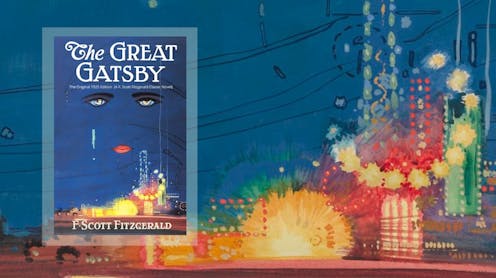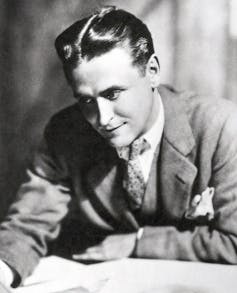Detta inlägg post publicerades ursprungligen på denna sida this site ;
Date:
Author: Alice Kelly, Assistant Professor of Literature and History, University of Warwick
Original article: https://theconversation.com/after-100-years-the-great-gatsby-still-reminds-us-of-the-ability-of-literature-to-transform-everyday-life-253664

Last November, I flew to New York to see a play: Gatz, an eight-hour reading of the entire text of The Great Gatsby by the experimental theatre ensemble the Elevator Repair Service.
As a Fitzgerald enthusiast, I couldn’t miss it. My journey to the US felt like a gesture of such luxurious excess that it seems to belong in the book itself. But I was surprised to find that the production was only in part about the novel. It was simultaneously a commentary on the ability of literature to take us beyond our everyday lives – and the upcoming centenary of The Great Gatsby will be the same.
With its fantastical, romantic subject matter, luxurious excess and its beloved language – not to mention the nostalgia many feel from studying it in school – The Great Gatsby reminds us of the ability of literature to transform everyday life.
Looking for something good? Cut through the noise with a carefully curated selection of the latest releases, live events and exhibitions, straight to your inbox every fortnight, on Fridays. Sign up here.
Gatz opens with an office worker discovering his computer doesn’t work and idly beginning to read aloud a copy of the novel on his desk. As his coworkers enter the office, they gradually become the characters of Fitzgerald’s novel. A brawny security guard becomes Tom Buchanan, an androgynous postal worker turns into Jordan Baker. The ageing boss becomes Jay Gatsby himself.
Gradually the first-person narration of the novel turns our unnamed office worker into the novel’s narrator, Nick Carraway. We remain in the harshly lit, dingy, unwelcoming office, which is transformed through inventive staging. The drunken party at Tom and Myrtle’s apartment is seen through office paper being thrown in the air and Gatsby pulls his shirts out of office filing cabinets.
Towards the end of the play, Nick starts flipping through the pages of the novel, while still reciting the words – his, and our, immersion in the novel is complete.
The joy of being read to
I saw the play on the Friday of election week in the US. In that context, the final entrancing passage of the novel had the effect of a secular incantation in a troubled world.
Carraway imagines the Dutch sailors (or colonisers) who first set sight on the Americas and how “for a transitory enchanted moment man must have held his breath in the presence of this continent […] face to face for the last time in history with something commensurate to his capacity for wonder”.
The play is a reminder of the joy of communal reading, an activity lost in our private silos of individualised content. Can the other characters hear Nick as he reads the novel aloud? It is unclear.
Adults love being read aloud to as much as children, as the increasing popularity of audiobooks demonstrates.
Reviewers of the original London production of Gatz in 2012 picked up on this, saying “a usually private activity, reading, has been turned into a collective one and it is intensely, surprisingly moving”.
Or are we meant to think that as the office worker becomes increasingly immersed in the book, the reality around him gradually disappears – as happens when we become lost in the pages of a book?
The clock on stage in the office doesn’t change time throughout the play, suggesting that we are outside of time when we read. Some reviewers argued that the play is about the private experience of reading: “What goes on in your head is, in a way, the real subject of Gatz, which is not, strictly speaking, a staged reading of The Great Gatsby … It’s more a dramatisation of the act of reading itself – of what happens when you immerse yourself in a book.”
Gatsby is a good choice for a play about the transformative role that reading and literature can play in life. It’s a representative text for what literature can do and achieve.
Gatsby wasn’t always great
Largely ignored on first publication, the novel didn’t achieve critical or commercial success until being sent by the Council on Books in Wartime to American soldiers serving overseas during the second world war, after Fitzgerald’s death.

Wiki Commons
Fitzgerald himself was torn between knowing he had written a masterpiece to doubting the success of the book. “Gatsby was far from perfect in many ways but all in all it contains such prose as has never been written in America before,” he wrote in a letter to a friend in May 1925. In autumn that year, he wrote to another friend about the novel’s cold reception: “At first, you know, I thought Gatsby must be a terrible failure.”
The novel now is arguably over-canonised – frequently set on British and American school syllabus, regularly hailed as the “greatest” American novel, with the idolisation of the text at the expense of Fitzgerald’s other work. Don’t get me wrong: I love the book, but I’m not sure even Fitzgerald himself held it in such high esteem as his dedicated readers do.
As the novel reaches its centenary this month – preceded by its passing out of copyright and into the public domain – the Gatsby industry has gone into overdrive. The enduring fascination with this story has already been seen in numerous film adaptations (the first, now lost, was released in 1926, a year after the novel was published). These have been complemented by biographies of the novel, graphic adaptations, a thriving tourist industry (The Great Gatsby Boat Tour, anyone?) and two new musicals.
The endless controversies over the novel continue. Who was the inspiration for Gatsby? Is Gatsby black? Is Gatsby’s love for Daisy romantic or delusional? Was Fitzgerald inspired by Great Neck and the contours of the north shore of Long Island for the geography of the novel? Or, in fact, his earlier home in Connecticut, as a recent documentary claims?
Gatsby has become more than just a novel, but instead a site for what literature can mean, and its endless capacity for interpretation and reinterpretation.
At the end of Gatz, there’s no return to the office setting of the play’s opening, no final framing narrative, just the lights going down after those final hypnotic words of the novel. Is this ending pure escapism – knowing the audience will shortly leave the space of the theatre and return to their everyday lives? Or does literature ultimately take us out of our mundane, harshly lit everyday existence, into other realms? If any novel can transport us, it’s The Great Gatsby.
![]()
Alice Kelly does not work for, consult, own shares in or receive funding from any company or organisation that would benefit from this article, and has disclosed no relevant affiliations beyond their academic appointment.

